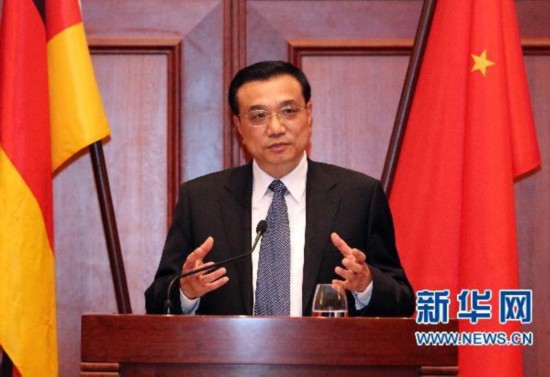李克强:中国同世界共成长
The world should not fear a growing China
|
 |
| File photo: China's vice-premier Li Keqiang |
英国《金融时报》刊发了李克强副总理的题为《中国同世界共成长》的文章。以下为全文:
| 中国始终不渝走和平发展道路的思想源远流长。早在2000多年前,中国古代著名诗集《诗经》中就写道:“民亦劳止,讫可小康;惠此中国,以绥四方”。大意为,百姓辛苦,应休养生息,享受安康;这既造福于中国人民,也有益于天下安宁。而今天的“小康”是指:人们学有所教、劳有所得、病有所医、老有所养、住有所居,生活温饱有余而充裕。全面建成小康社会,是中国到2020年的发展目标。中国人民既期盼自己幸福安康,也希望邦邻和谐。中国的发展,需要市场、资源等方面国际合作,更需要和平的外部环境。世界和平是中国实现小康的重要条件,中国发展了也有利于世界和平。 |
There is a long history to China's pursuit of the path of peaceful development. The Book of Songs, a collection of Chinese poems and songs compiled more than 2,000 years ago, reads, "Give relief to people who have toiled much, so they may enjoy a life of Xiaokang. Promote it (Xiaokang) throughout the Central Kingdom and peace will be secured for all the four quarters." What it means is, when people work too hard, they should be given relief so that they may lead a comfortable life. Doing so benefits the people of China – and the world. The term "Xiaokang" is used today to refer to a society where people can receive education, get paid through work, have access to medical services and old-age support, have a shelter and more than enough food and clothing and lead a well-off life. To build a Xiaokang society in all respects is China's development goal by 2020. The Chinese people both long for a happy and peaceful life for ourselves and hope to enjoy harmonious relations with our neighbours. China's development calls for international co-operation over access to markets and resources, and more importantly requires a peaceful external environment. World peace is an important condition for China to achieve Xiaokang, or moderate prosperity, and China's development in turn is conducive to world peace. |
| 中国的发展对其他国家是有益的。近年来,中国经济增长对全球增长的贡献率在10%-20%,2009年达到50%。2010年中国经济预计增长10%左右,商品零售总额增长18.5%,内需对经济增长的贡献率在90%以上。内需的扩大增加了进口。去年中国进口额预计超过1.39万亿美元,居世界第二。我们需要稳定和拓展外需,更致力于扩大内需。中国人口占世界1/5,国内市场潜力巨大。我们欢迎世界各国有竞争力的产品和服务进入中国市场,并将为各国投资者提供更加公平透明的创业环境。 |
China's development benefits other countries. For the past few years, China has contributed 10-20 per cent to world economic growth. Its contribution in 2009 was 50 per cent. Estimates show that in 2010 China's economy grew by about 10 per cent, and retail sales rose by 18.5 per cent. Domestic demand contributed more than 90 per cent to China's growth. At the same time, expanding domestic demand has increased China's imports. It is estimated that in 2010 China's imports from other parts of the world may well top US$1,390 bln, ranking the second in the world. China needs to stabilise and expand external demand. At the same time, and more important, it will boost domestic demand. With its population making up one fifth of the world's total, China offers a market with enormous potential. We welcome the entry into our market of competitive goods and services from around the world, and will provide a fair and even more transparent environment for foreign investors. |
| 中国愿与各国携手解决能源资源这一全球性难题。过去五年,我们坚持节约优先,单位国内生产总值能耗下降20%左右。今后五年,我们将大力发展绿色经济、低碳技术,努力使单位国内生产总值能耗、单位国内生产总值二氧化碳排放继续大幅下降。目前中国90%以上能源消费靠国内生产,未来我们仍将立足国内解决能源资源问题,加大国内勘探开发力度,形成一批新的能源资源战略接续基地。 |
China is committed to work with other countries for a solution to the global challenge of energy and resources. In the past five years, China has worked hard to save energy and resources. China's energy consumption per unit of gross domestic product has dropped by about 20 per cent. In the coming five years, China will vigorously develop the green economy and low-carbon technologies to bring down significantly energy consumption and CO2 emission per unit of GDP. China relies on domestic supply for more than 90 per cent of its energy consumption, and will continue to rely on domestic supply to appropriately address the issue of energy and resources. By enhancing domestic exploitation and development, China will build a new group of strategic reservoirs of energy and resources. |
|
|
|
|


Go to Forum >>0 Comments